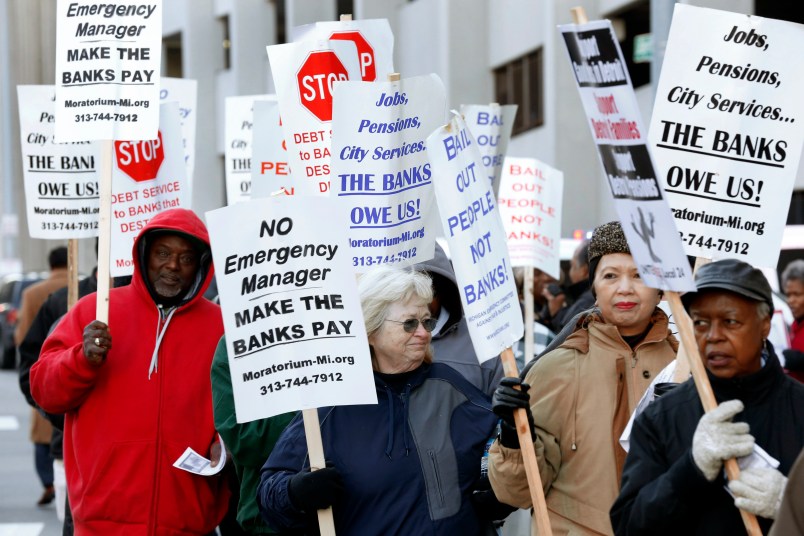DETROIT (AP) — Lawyers for Detroit will attempt to convince a federal judge at the city’s bankruptcy trial that its plans to wipe out billions of dollars in debt should be approved.
After some delays, the start of the trial Tuesday in U.S. District Court comes just over 13 months after Detroit became the largest U.S. city to file for bankruptcy.
Detroit expects to cut $12 billion in unsecured debt to about $5 billion, which is “more manageable,” according to Bill Nowling, a spokesman for emergency manager Kevyn Orr.
Most creditors, including more than 30,000 retirees and city employees, have endorsed the plan of adjustment put together by Orr and his restructuring team.
The plan includes commitments from the state, major corporations, foundations and others to donate more than $800 million over 20 years to soften cuts to city pensions. In return, pieces in the city-owned Detroit Institute of Arts would be placed into a trust to keep them from being sold to satisfy creditors.
General retirees would take a 4.5 percent pension cut and lose annual inflation adjustments. Retired police officers and firefighters would lose only a portion of their annual cost-of-living raise.
The strongest opposition to the plan has come from bond insurers like New York-based Syncora Guarantee. Syncora has said its claim is about $400 million and that Detroit has unfairly discriminated against financial creditors.
“It has been a very fast-track bankruptcy, which Syncora has no issue with,” company attorney James Sprayregen said. “Syncora’s issue is the lack of transparency of the process and the unfair treatment of its claims.”
Bankruptcy Judge Steven Rhodes has scheduled additional hearing dates, if needed, into October. But in the end, bankruptcy expert Anthony Sabino expects Rhodes to approve Detroit’s bankruptcy plan — followed by appeals from creditors.
Copyright 2014 The Associated Press. All rights reserved. This material may not be published, broadcast, rewritten or redistributed.







Kind of amazing their pensions had inflation protection. It’s a big concession to give it up, particularly for people who lived thru the double-digit inflation of the 80s. Say inflation is about 3%, 10 years into retirement that will be about a 25% cut in spending power, making the initial 4.5% cut look small.
It is interesting to note that the big money boys who made the mess feel that the pensioners who had nothing to do with the monetary hanky-panky should be the ones to bear the costs of the mess. Don’tcha think the pensioners always had their portion of pension contributions deducted from their pay? Nothing like that Pubbie doctrine of personal responsibility.
republicans fucking the working folks again, that is all this is.